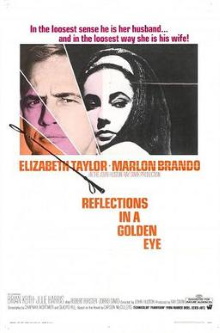Without intending to, it seems like we’ve watched two older films about psychologically dysfunctional characters back to back this week. I’ve liked pretty every John Huston film I’ve seen so far but this one is by far the most subversive, most subtle one of the lot. In fact, given that it was roundly panned by critics at the time, I believe that audiences of the time either did not understand the film or were unprepared to accept what it had to say. It essentially accuses the US military of churning out personnel who are sexually repressed and therefore all somewhat crazy, making it an incredibly bold and ahead of its time film.
Major Weldon Penderton is an instructor at a US Army fort with a glamorous wife Leonora who, being the daughter of a general, is used to military life. She loves riding her favorite horse Firebird and is secretly having an affair with their neighbor Morris Langdon, a fellow officer. Morris’ wife Allison has been suffering from depression ever since their child died and only her Filipino domestic servant Anacieto can cheer her up. Meanwhile Firebird is mainly taken care of by an enlisted soldier Private Williams. One day while the Pendertons and Morris are riding together in the woods, they notice Williams also riding a horse completely in the nude. Weldon expresses his anger and disgust but Leonora tells them to leave him alone to his fun. What they don’t realize is that Williams has the habit of sneaking into the Penderton’s house at night to watch Leonora sleeping nearly naked.
So Weldon, Williams and Allison all have serious mental issues while Leonora is arguably something of a spoiled brat who only cares about her own happiness and pleasure. The thing is this film doesn’t look like a dark psychological thriller. It has a pleasantly golden color palette, the army town feels like a wholesome suburban neighborhood and of course it stars Marlon Brando and Elizabeth Taylor as leading, respectable figures of the community. A critic of the era called it a melodrama because it looks like one but I believe Huston meant the contrast between the visuals of the film and its content to be ironic. The seemingly square Weldon is a closet homosexual and suffers anxiety about growing old and weak. Williams is a voyeur who is both attracted and repulsed by women. Allison’s trauma has driven her to serious self-harm and foolish delusions. Her husband Morris is the most normal of the lot and his failing is in not noticing how badly things have gone wrong for the people around him. He can be read as representing society at large. He dismisses the antics of Anacieto as being silly and effeminate, wishing that he could straighten him out in basic training, but doesn’t understand that his games and activities are the only things keeping Allison from falling apart.
Earlier I lauded The Power of the Dog for its revisionist take on the cowboy archetype. So I am pleasantly surprised that Huston had done the same on the archetype of the career soldier all the way back in the 1960s! The character of Anacieto is especially fascinating to me, a lowly house boy of foreign origin who is nevertheless intelligent, artistic and has enough pride in himself to get back at the soldiers who belittle him. Modern commentators debate about the feminization of US society and here we have an excellent example of it in culture, presented as an unalloyed good by the director. Contrast the cheery and confident Anacieto who finds delight in watercolor paintings and fashion shows with the male icons who are gruff, outwardly strong and deliberately manly but are actually either out of touch or inwardly insecure with deep-set hypocrisies embedded in their psyches. The critique is made all the more powerful by having Marlon Brando play the deeply flawed man.
One particularly disturbing scene has Morris brutally beat a horse. I don’t know how they pulled off that shot but the terrified look in the horse’s eyes seems genuine and it would be unethical if they truly did terrorize the horse to make it work. Apart from that, I found this to be an amazing film even if it Marlon Brando and Elizabeth Taylor didn’t seem to have put their full acting chops into it as some critics have claimed. I think this film has been badly underrated and deserves to be revisited by modern audiences.
